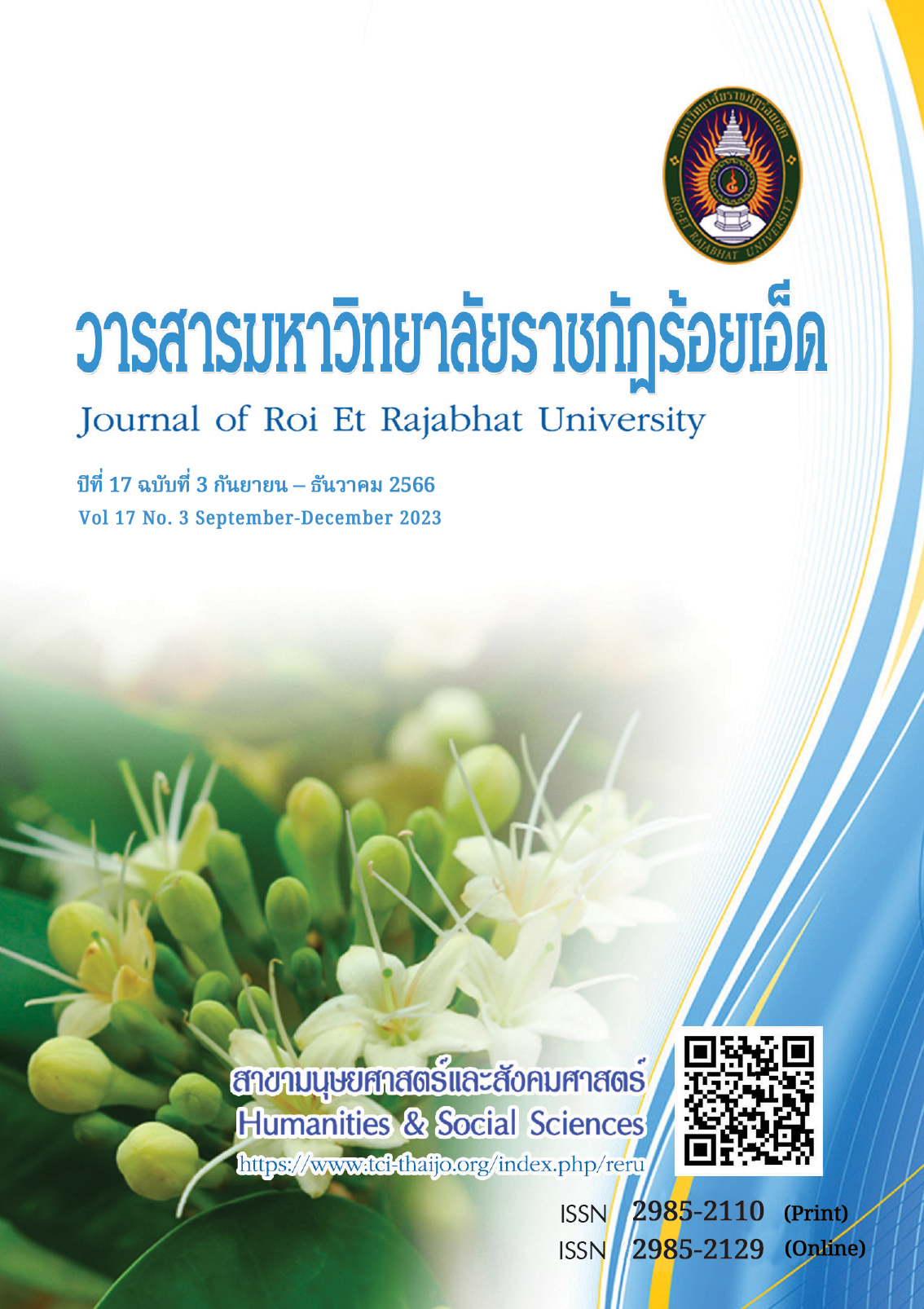Knowledge Management towards Sustainable Development as Stated in the Philosophy of Sufficiency Economy: A Case Study in Kong Thanu subdistrict, Mueang Lop Buri District, Lop Buri Province
Keywords:
Knowledge management, Sustainable development, The philosophy of sufficiency economyAbstract
The aims of this research were to 1) gather, categorize, and establish a sustainable social capital database in accordance with the sufficiency economy philosophy, 2) analyze the factors that influence
the management of sustainable development patterns in production and consumption, as outlined in
the sufficiency economy philosophy, 3) create a model for managing the patterns of sustainable development in production and consumption, as outlined in the sufficiency economy philosophy, and 4) disseminate knowledge about sustainable development in production and consumption, as outlined in the sufficiency economy philosophy. This study employed a qualitative research methodology. The investigation was conducted
in the village numbered 1 to 14, located in Kong Thanu subdistrict, Mueang Lop Buri district, Lop Buri province. The research samples included of the senior management team of Kong Thanu subdistrict administrative organization, as well as representatives of community leaders and villagers. The research methodology employed in this study involved the utilization of in-depth interviews and focus group discussions as
the primary data collection instruments. The data were examined using content analysis. The research findings demonstrate that the development of social capital is sustained in accordance with the principles of
the sufficiency economy philosophy in both production and consumption. This is evident in the outcomes of the projects "Ban Nee Mee Rak Plook Pak Kin Aeng" (cultivating vegetables for personal consumption)
and "Tang Nee Mee Phol Poo Kon Rak Kan" (Share the Love, Share the Veggies), which have contributed to the villagers' food security, good health, access to organic vegetables, and overall well-being in their pursuit of sufficiency living. Additionally, another exemplary approach can be observed in the Kong Thanu concept for community garbage management, which employs the 3Rs principle. The villagers exhibited a high level of discipline and cooperation in order to effectively sort household rubbish. The recyclable rubbish was transported to be sold at the recycling center. Consequently, every village was immaculate. The locals maintained high standards of cleanliness and lived in a healthy environment. Consequently, Kong Thanu subdistrict emerged as the epitome of a model community and a center for learning. The factors that influenced
the management of sustainable development patterns, as outlined in the sufficiency economic concept, can be observed in the elements of "leadership team, Boworn teamwork, and positive change". Their successful accomplishment of their work objectives may be attributed to the implementation of His Majesty King Bhumibol Adulyadej's work development principles, which include understanding, obtaining insight and access,
and actively participating in development.
References
จามรี พระสุนิล. (2562). ย้อนรอยพระบาทที่ยาตรา เรียนรู้สู่ศาสตร์พระราชา. วารสารมนุษยศาสตร์สังคมศาสตร์, 36(3), 1-38.
ณวกษิดิศ พลพลากรณ์โสภณ, มยุรี รัตนเสริมพงศ์ และวาสิตา เกิดผล ประสพศักดิ์. (2565). การจัดการความรู้ปรัชญาเศรษฐกิจพอเพียงในการนำไปพัฒนาชุมชนขององค์การบริหารส่วนตำบลโก่งธนู อำเภอเมือง จังหวัดลพบุรี. วารสารวิชาการ มนุษยศาสตร์และสังคมศาสตร์ มหาวิทยาลัยราชภัฏพระนครศรีอยุธยา, 10(1), 101 - 129.
บ้านเมือง. (2562). พช. ร่วมเป็นส่วนหนึ่งในการอนุรักษ์สิ่งแวดล้อม. สืบค้นเมื่อ 21 มกราคม 2566, จาก https://www. banmuang.co.th/news/politic/168823
บำเพ็ญ เขียวหวาน. (2563). เอกสารการสอนชุดวิชาหลักปรัชญาเศรษฐกิจพอเพียงและการจัดการการเกษตร ทรัพยากรธรรมชาติ สิ่งแวดล้อม (หน่วยที่ 15). นนทบุรี: โรงพิมพ์มหาวิทยาลัยสุโขทัยธรรมาธิราช.
เริงวิชญ์ นิลโคตร, นิภาวรรณ เจริญลักษณ์, วงษ์สิริ เรืองศรี และฐิติวัสส์ สุขป้อม. (2564). การประยุกต์ใช้ศาสตร์พระราชาเพื่อเสริมพลังอำนาจสุขภาวะชุมชน. วารสารสังคมศาสตร์และวัฒนธรรม, 5(2), 54-69.
สมชัย แสนภูมี และวิณากร ที่รัก. (2565). การประยุกต์ใช้ศาสตร์พระราชากับการวิเคราะห์ปัญหาชุมชนในจังหวัดนครปฐม. วารสารวิชาการธรรมทรรศน์, 22(4), 229-240.
องค์การบริหารส่วนตำบลโก่งธนู. (2565). ข้อมูลพื้นฐาน. สืบค้นเมื่อ 11 ธันวาคม 2565, จาก https://www.kongthanu.go.th/home
Arifudin, B. N. and Maswadi. (2013). Program of Community Empowerment Prevents Forest Fires in Indonesian Peat Land. Procedia Environmental Sciences, 17(1), 129-134.
Brinkerhoff, D. W. and Omar, A. (2006). Decentralization and Community Empowerment: Does community
empowerment deepen democracy and improve service delivery?. Washington DC: International Development Office of Democracy and Governance.
Burin, J. (2022). Sustainable Community Model: Klong Thong Noodle. Retrieved January 21, 2023,
From https://www.pass iongen.com/burin-journey/2022/16
Mookpadit, M. (2005). An Analytical Study of H. M. The King’s Sufficiency Economy Philosophy and Buddhism. Dissertation Doctor of Philosophy. Bangkok: Mahachulalongkornrajavidyalaya University.
Downloads
Published
How to Cite
Issue
Section
License
Copyright (c) 2023 Roi Et Rajabhat University

This work is licensed under a Creative Commons Attribution-NonCommercial-NoDerivatives 4.0 International License.
บทความที่ได้รับการตีพิมพ์เป็นลิขสิทธิ์ของวารสารมหาวิทยาลัยราชภัฎร้อยเอ็ด
ข้อความที่ปรากฏในบทความแต่ละเรื่องในวารสารวิชาการเล่มนี้เป็นความคิดเห็นส่วนตัวของผู้เขียนแต่ละท่านไม่เกี่ยวข้องกับมหาวิทยาลัยราชภัฎร้อยเอ็ด และคณาจารย์ท่านอื่นๆในมหาวิทยาลัยฯ แต่อย่างใด ความรับผิดชอบองค์ประกอบทั้งหมดของบทความแต่ละเรื่องเป็นของผู้เขียนแต่ละท่าน หากมีความผิดพลาดใดๆ ผู้เขียนแต่ละท่านจะรับผิดชอบบทความของตนเองแต่ผู้เดียว





